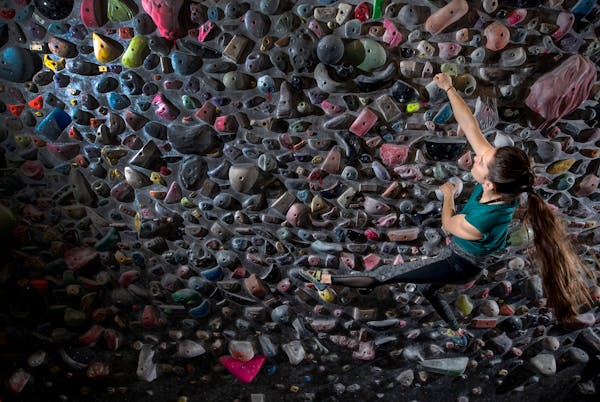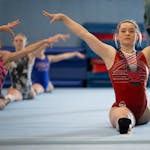TOKYO — Kyra Condie noticed the connection right away. The Olympic motto — faster, higher, stronger — lines up perfectly with the three disciplines of climbing.
"Higher is lead climbing, where you're going as far as possible up the wall,'' Condie said. "Faster is speed climbing. Stronger is bouldering. It's kind of cool how they're related.''
It's even cooler to be part of her sport's Summer Games debut. Condie, a Shoreview native, is among four U.S. athletes competing in Tokyo for the first Olympic medals awarded in climbing. The women's competition starts with Wednesday's qualification round at Aomi Urban Sports Park (3 a.m. Central time on NBCOlympics.com), which will determine the eight climbers who advance to Friday's finals.
The Olympic format is an unusual one. Climbers typically specialize in one discipline, but Olympic organizers chose to award only one set of medals per gender at the Tokyo Games. The International Federation of Sport Climbing decided it would be best to create a format that would showcase all three styles.
That will make the Tokyo Games a test of adaptability, a quality Condie has in abundance. She has become one of the country's top climbers despite limited mobility in her back, caused by spinal-fusion surgery to correct severe scoliosis.
Condie already was in love with climbing when her spinal curvature was diagnosed. She discovered the sport while in elementary school, when she attended a friend's birthday party at St. Paul's Vertical Endeavors. Before her surgery, her parents found a doctor who believed the procedure would not prevent Condie from climbing.
"He said, 'Send me a photo when you're on top of the podium,''' she recalled. "I have basically one bone from T2 [vertebra] to T12. It took some getting used to, but I was climbing again four months after the surgery.''
The U.S. qualified two women and two men for the Tokyo Games, the maximum allowed. Condie is seeded 14th, and teammate Brooke Raboutou is the No. 7 seed.
As Condie noted, speed climbing reflects the "faster'' part of the Olympic format, as athletes climb side-by-side up identical routes in a race to the top of a 49-foot-high wall. Lead climbing is the "higher'' piece, with the goal to climb as far as possible. "Stronger'' comes into play in bouldering, as athletes tackle shorter routes without ropes.
A bouldering specialist, Condie is ranked 19th in the world in that discipline. She is 20th in speed and 35th in lead. Though she hasn't had the World Cup results she hoped for this season, she said the results can be a little misleading because Olympic qualifiers are training in all three disciplines while others are specializing.
"My training feels really, really good,'' Condie said. "The results don't feel like a reflection of my training or how well I'm prepared. I feel really confident about where I am in all the disciplines for this combined format.''
Condie coached herself for years, training at The A, a tiny climbing gym she helped build in northeast Minneapolis. A graduate of Mounds View High School and the University of Minnesota, she moved to Salt Lake City in 2019 to train with other top climbers under the guidance of USA Climbing coaches.
She expects climbing to get a big boost from its time in the Olympic spotlight. Japan has produced many of the world's best climbers, which helped the sport get on the schedule for Tokyo.
Adam Ondra of the Czech Republic is one of the best-known competitors in the Olympic field of 20 men and 20 women. Ondra, who has won 11 world championships and scaled three of the world's four most challenging routes, is thrilled about the exposure the Summer Games will bring.
"It's a big step,'' he said. "It's been a big dream for long years. Unfortunately, there's only one set of medals, but hopefully it will be a good stepping stone for the future. Climbing deserves to be here.''
Condie said climbing hasn't always gotten its due. For years, she said, people told her it wasn't really a sport.
Now that it's part of the Olympics, she has the ultimate retort.
"We didn't grow up with the dream of climbing being in the Olympics,'' she said. "To be here with a full team of four athletes is definitely cool. It shows how much USA Climbing has improved.
"We're already seeing a boom, with huge gyms popping up all over the place with tons of members. With the extra media attention from the Olympics, I think it's going to make climbing explode. That would be great. The more people we can introduce to our sport, the better.''




